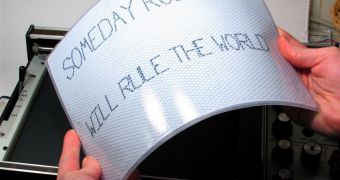Normally, a new sort of processor wouldn't be that big a research milestone if it didn't have superior processing capabilities to those of today, but the first even organic microprocessor bypassed this requirement by virtue of its flexibility.
Usually, when speaking of an IT product and saying it is flexible, the word is often a metaphor for versatility or compatibility with various other hardware.
There are, however, certain devices, like e-paper and other displays, that fit the word's base meaning, although not many.
Now, a team of researchers from Europe claim to have succeeded in making the world's first organic microprocessor, one that can bend.
The chip holds 4,000 transistors, a number that is quite small compared to silicon chips, which hold hundreds of millions of them.
Researchers even admit to the high likelihood that organic chips will never really be all that powerful, especially compared to x86 and even ARM units.
In fact, even this prototype only has enough power to match silicon models made way back in the 1970s.
Nevertheless, the new item got attention at the International Solid-State Circuits Conference thanks to its ability to bend.
Flexible displays are just one application for such chips, with sensors used for construction, food, pharmaceutical labeling and even clothing being others.
For those that want technical details, the chip has a plastic substrate, a 25-nanometer-thick layer of gold over it and an organic dielectric, a second patterned gold layer and a pentacene organic semiconductor.
What's more, an extra gate had to be added to the back of each transistor, in order to avoid extra switching, which was the reason why an organic processor wasn't developed until now.
“You could compare it to the material that you use to wrap your sandwiches,” says Jan Genoe, a polymer and molecular electronics researcher at Belgian nanotech research center Imec, in Leuven. “It’s very flexible.”

 14 DAY TRIAL //
14 DAY TRIAL //